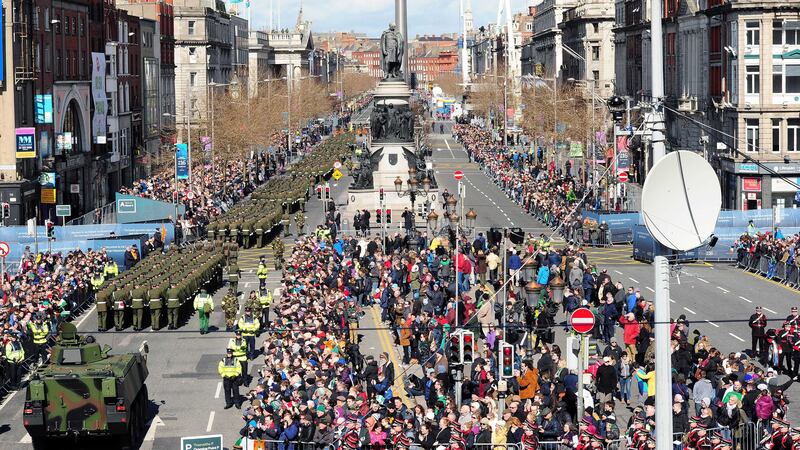HISTORY Rewrites itself many times, and then it emerges as myth. The Easter Rising is a case in point.
Easter Monday, marks its centenary. That fact will not have escaped you. Easter is as important to the Irish and Irish history, as the day it celebrates its patron saint.
Such is the pivotal importance of the rising, that it needs no big-nought birthday to get attention. But the centenary is an opportunity for reflection and a time to evaluate the values that underpin Irishness.
It is also a moment to think about the journey we have undertaken as a nation over the past 100 years – and to decide whether we need to recalibrate.
If any nation needs to think hard about where it’s at, it is this one. Today’s Ireland is a far cry from that envisioned in the Proclamation.
It’s not difficult to find evidence for that. The commemorations themselves give a sense of our modern day priorities. It’s all about the money. Take a walk through Dublin and you’d be forgiven for thinking the leaders of the rising made the ultimate sacrifice to provide us with a marketing peg to sell, sell, sell.
Quite what Socialist icon James Connolly would have made of the tawdry money-making trade in memorabilia is anybody’s guess. The souvenirs are cheap tat made in China for an audience that cares little for the ideals of the 1916 leaders.
You can even buy chocolate bars with wrappers emblazoned with images from the rising. Given some 500 people died – most of them civilians caught in the crossfire - this must qualify as the most tasteless chocolate in Ireland’s culinary history.
There was a day when myths were the stuff of song, when they were spoken of by poets and carved in stone. Today they are printed on plastic wrappers to be thrown away as litter.
But perhaps I am too cynical. Today is not a day for cynicism, but for reflection.
Violence is troubling, and it is unquestionably the case that Pearse acted without the endorsement of the people.
The sovereignty he declared on the steps of the GPO was claimed without authority.
But it is important that we judge those who took part in this act of defiance by the standards of their own time.
It was only after the cack-handed British reaction - the executions (Connolly strapped to a chair), the imposition of martial law and the incarceration of many who had no involvement in the events of Easter Monday – that Ireland awoke. Legitimacy was conferred in retrospect.
But legitimised the rising was, and quickly too.
There is no doubting the idealism of the men who took up arms that fateful morn, or their bravery in the face of overwhelming odds. Pearse must have known Britain would mobilise its forces against him. His was an act of war in the midst of an even greater one.
Countless battles have been fought for power or wealth or other grubby motives. The Trojan wars were fought over a love affair, and Britain once went to war with Spain over a severed ear.
But this was noble. It was a poets’ revolution: a fight for culture and national identity. And it is hard not to be seduced by that, particularly from the distance of five score years.
There is truth in poetry, there is truth in the stories we create and tell one another. And there is truth in myth. This Pearse understood all too well. By tapping into that most potent of stories – the Resurrection – Pearse was consciously shaping the foundation myth for a fledgling nation.
It feels like heresy to articulate it, but in Ireland now the two stories are almost indivisible: the British the occupying legions in Palestine, the Redmondites complicit in British rule, and Herbert Asquith Pontius Pilate to Pearse’s martyr.
“We are ready to die and we shall die peacefully and proudly,” Pearse wrote to his mother before his execution.
The unfinished business is uniting Ireland – a nation that transcends borders; a nation that embraces a global diaspora and, more important still, a nation that has yet to win the hearts and minds of a million or so people in the north east of the island.
“Cherishing all the children of the nation equally,” was the sentiment in the Proclamation, and that has not yet been realised.
That must be our ambition today. Romantic Ireland’s dead and gone. In a world where national sovereignty is not about isolationism, and where borders are virtual and porous, the need to transcend petty sectarianism has never been greater.









